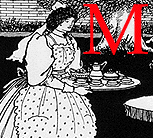 rs. Bennet claims, “Nobody can tell what I suffer! But it is always so. Those who do not complain are never pitied!" in chapter 20 of Pride and Prejudice (1813). Mrs. Bennet, like Mrs. Joe Gargery, represents the incompetent parent. Both are flat characters who represent distorted moral values. Mrs. Bennet concerns herself with marrying her daughters off and Mrs. Joe proudly brings Pip up “by hand." Pip, who has three groups of parental figures — his real parents (who are dead), Mrs. Joe and Joe, and Magwitch (who says,"Look'ee here, Pip. I'm your second father. You're my son") — can find no positive parental figure among them. Each is either absent, irresponsible, or incompetent.
rs. Bennet claims, “Nobody can tell what I suffer! But it is always so. Those who do not complain are never pitied!" in chapter 20 of Pride and Prejudice (1813). Mrs. Bennet, like Mrs. Joe Gargery, represents the incompetent parent. Both are flat characters who represent distorted moral values. Mrs. Bennet concerns herself with marrying her daughters off and Mrs. Joe proudly brings Pip up “by hand." Pip, who has three groups of parental figures — his real parents (who are dead), Mrs. Joe and Joe, and Magwitch (who says,"Look'ee here, Pip. I'm your second father. You're my son") — can find no positive parental figure among them. Each is either absent, irresponsible, or incompetent.
Similarly, the Bennets are poor parents. Austen shows Mrs. Bennet's incompetence by means of humorous characterization and exaggerated satirical dialogue. Dickens presents Mrs. Joe and Mr. Pumblechook with this technique. Mrs. Bennet reveals her absurd nature when she claims that she is not pitied because she never complains, right after she has complained about all she suffers. The parents' absurd pride and self-pity appears often in the early chapters of Great Expectations, such as when Mrs. Joe describes all the illnesses Pip was “guilty of," all the “acts of sleeplessness" he had committed, all the injuries he had done himself, and all the times she had wished Pip in his grave. Mrs. Bennet and Mrs. Joe share the notion that their children should be grateful for having them for parents. Because Lizzie will not marry Mr. Collins, Mrs. Bennet calls her “undutiful." Mrs. Joe declares, “if this boy an't grateful this night, he never will be!" Consequently, the two mothers are not only wholly dislikable, but also humorous in their exaggerated characterizations.
Last Modified 23 October 2002